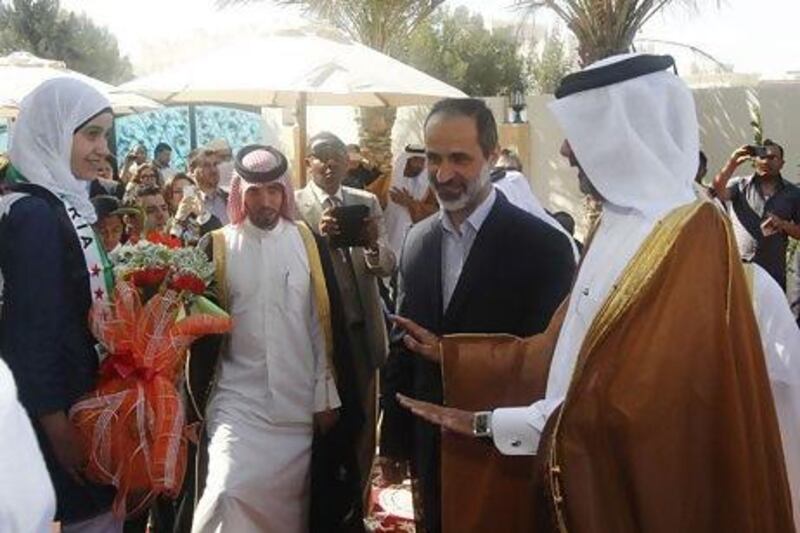DOHA // Arab heads of state ended a regional summit in Doha united in opposition to Syrian president Bashar Al Assad and under increasing pressure from the enemies of his regime to step up their support in their two-year revolt to overthrow him.
But a series of quick diplomatic victories for the opposition were just as immediately overshadowed by reminders that, outside the Arab League summit, international divides over the crisis are deepening.
"There is an international conviction for the revolution not to succeed," said Moaz Al Khatib, who led the opposition delegation to Doha despite resigning as Syria National Coalition (SNC) president on Sunday. His words reiterated a charge the former Damascus cleric has levied repeatedly in recent days against world leaders' fickle support for the revolution.
Qatar leveraged its diplomatic weight to hand the coalition Syria's seat in the Arab League. Hours later, the SNC won a strongly worded final resolution that "affirmed the right" of Arab member states to provide arms and other support to the rebels.
Although Qatar and Saudi Arabia have reportedly been supplying elements of the opposition with arms for months, the resolution offered both legitimacy and a shroud of legal protection to member states. The measure won the backing of 18 of the 22 members without reservation, said Qatar's prime minister and foreign minister Hamad bin Jassim bin Jaber Al Thani.
"The Syrian government receives weapons all the time," said Nabil ElAraby, secretary general of the Arab League in remarks after the summit concluded. "We are requesting more weapons to support the opposition such that this might establish a balance between two parties."
Down the road from where the summit concluded, the Syrian opposition opened its first embassy yesterday in a new villa about 10 minutes from the former Syrian Embassy.
Nizar Al Haraki, the new ambassador, opened the embassy in front of a crowd, which included ambassadors from countries as wide ranging as the United States, France, Hungary, Belgium and Djibouti.
"I think a lot of other countries now, after the summit, will also deal with [the Syrian opposition] as the legal representatives of the Syrian people," said Libyan ambassador Abd El Munsif Elburi, attending the ceremony.
Yet, in many ways, the increasing Arab consensus in support for the opposition has sharpened international divisions over the two-year conflict that has left an estimated 70,000 dead and sent more than 1 million refugees fleeing over the borders.
Western countries have reluctantly approved that Gulf states supply weapons to the opposition, but they have been slow to act directly themselves.
In his remarks to Arab leaders on Tuesday, Mr Al Khatib said he had asked the US to consider extending its Patriot missile system to defend rebel-held areas of northern Syria, but the suggestion was quickly dismissed by the White House.
"Yesterday I was really surprised by the comment issued from the White House that it was not possible to increase the range of the Patriot missiles to protect the Syrian people," Mr Khatib told Reuters.
"I'm scared that this will be a message to the Syrian regime telling it 'Do what you want'."
Qatar, which hosted the Arab League summit, helped orchestrate the diplomatic victories this week, but even this has not been without caveats. The Syrian opposition has had to actively work to dispel charges that it is overly influenced by the Qataris.
"The emir of Qatar, the biggest bank for supporting terrorism in the region, began his presidency of the Arab League by hijacking it with tainted oil and money," Syrian state media said yesterday.
Also yesterday, Mr Al Assad extended a plea to members of the so-called BRICS nations — Brazil, Russia, India, China and South Africa — to help his embattled regime. Syria, he said in a letter published in state media, has been the victim of "acts of terrorism backed by Arab, regional and western nations".
The Qatari premier, Mr Al Thani, rejected accusations that his country was meddling in Syria or other Arab Spring countries' affairs.
"For about 18 months, we worked [to resolve the Syrian conflict] before mentioning armament, but this peaceful solution has not come because the regime was wasting time," he said.
"We are accused of many things," he continued, dismissing charges that his government had backed particular elements in Syria and elsewhere as "a fabrication."
"It's normal to see division within the reactions to Qatari policy, between those supporting the changes in the region and those not supporting," said Mahjoob Zwieri, dean of humanities at Qatar University.
"The Qataris believe they are on the right side of history.
"Whether there will be a real political solution or not, this will rely on the international community's will, and whether they want to get this done or whether they are enjoying watching this suffering in Syria."
twitter: For breaking news from the Gulf, the Middle East and around the globe follow The National World. Follow us






